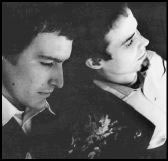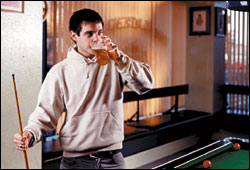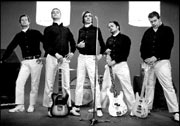PLAID, SQUAREPUSHER
Showbox, 9 p.m. Wed., Aug. 8 $15 adv. / $17
IN DANCE MUSIC, the combination of studio technology and human inspiration yields such incredible volume and variety, the naming of subgenres and even subsubgenres has become almost compulsory. But still, Intelligent Dance Music? There’s something just a little, well, insulting about it. If there is IDM, it unavoidably follows, there must also be SDM—Stupid Dance Music. Beat haters certainly have no problem with that thesis: Those who champion the unvocodered human voice and the good old-fashioned six-string have been calling dance music stupid—and a whole lot worse—for years.
But stupid is as stupid does, says Plaid’s Andy Turner. “I think it’s really annoying because it’s meaningless; I don’t really want to be in either camp. I wouldn’t say our music is classic IDM anyway,” he continues, “‘cuz it’s not particularly serious, and it’s not particularly experimental. We’re definitely not intelligent.” On second thought, Turner demurs, “I think it’s good that there is this kind of serious, intellectual sort of music that’s quite introverted and experimental and avant garde. That’s quite healthy, because that’s been missing from dance music. It was all kind of about hedonism and just, you know, going off for a while. I can get into that as well, but it makes it a bit more universal and gets the other side of humanity, which is the serious, thoughtful side.” So then, how about just plain DM? “Yeah, why not?”
Turner and partner-in-crime Ed Handley, friends since high school (or its British equivalent), know their way around the scene: They began as mere fans and eventually evolved from good-time ravers to bona fide creators. The pair first made waves with Ken Downie and Black Dog Productions in the early and mid-’90s. Together, the trio created some of the U.K.’s best early techno efforts, full of texture, nuance, and an assured feel for America’s already burgeoning underground scene. “I do miss [that era],” admits Turner, “because it was fun, and it was a time when everything was changing in England in music. We’d just heard a lot of the Detroit and Chicago sound; that was all very exciting, and there were a lot of parties. But as a group, it got a bit difficult after a while socially, so I don’t miss that too much.” Though they would work again with another buddy, Mark Broom, the pair decided that three was indeed often a crowd, and over the past several years have kept production primarily in their own court. That doesn’t mean they’ll necessarily be doing it all within Plaid’s parameters. When asked if, in the grand tradition of so many other chameleonic dance producers, the duo has plans for conjuring up an alter ego or three, Turner responds, “You know, we’re always buggering away; there’s sort of schizophrenia, but we don’t have any specific plans. We have this one idea we might do, which wouldn’t really fit with Plaid. I think when you create something musically that’s so different from what you normally do, it’s quite good to have a pseudonym. It just keeps things interesting.”
KEEPING THINGS interesting for Plaid doesn’t mean exactly the same thing it means to tourmate Squarepusher or other boundary-pushing contemporaries. It’s clear on Plaid’s recent release, Double Figure (Warp), that the pair tend to favor craftsmanship and melody over the more frantic, apocalyptic, and technologically complex sounds preferred by many of their studio peers. “We are fairly mellow in comparison,” Turner agrees. “[Tom Jenkins, a.k.a. Squarepusher, is] definitely the daddy when it comes to that hardcore drum programming. As a night’s entertainment, though, I think it works, because you get a bit of both.” The only close comparison the band can find to their own sound is the equally admired Boards of Canada. While Turner and Handley do promise to play their more upbeat numbers live (“There’s a bit of an obligation”), don’t expect them to be knocking on house divas’ doors anytime soon: “We still prefer instrumental music. It just sounds freer, and lyrics are a bit of a problem for us because we don’t have anything specific that we’d actually like to put down in words.
“But I still think the human voice is the ultimate instrument, so when the timing’s right and we meet the right people, we’re all for it. We can do it,” Turner says, sounding poised, self-assured, and—dare we say it?—intelligent.








